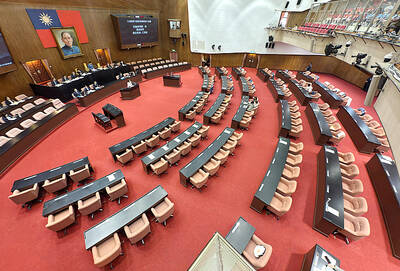Oil prices dived to 17-month lows on global recession fears, hitting US$59.02 in London and US$61.30 in New York on Monday before clawing back some lost ground.
“Oil markets seem to be pricing in a deep and long recession that will derail oil demand growth this year and next,” UBS economist Jan Stuart wrote in a research note to clients. “Even though we still think that the credit crunch is exaggerating the real shift in oil demand trends, we have no way to know.”
UBS also slashed its forecasts for average Brent oil prices to US$60 for next year and US$75 in 2010 from previous estimates of US$105 and US$116 respectively.
Oil prices sank this week after data showed that the US economy — the biggest consumer of energy in the world — contracted at a 0.3 percent annualized pace in the third quarter as a global credit crunch saw consumers and businesses cut back on spending.
“Crude oil fell after the release of the US [growth] figures,” Dresdner Kleinwort analyst Peter Fertig said.
“It is likely to head further down as declining US consumer spending could intensify the fear of falling oil demand. This would also be a drag on gold and other metals,” he said.
Crude prices had risen on Wednesday after interest rate cuts in the US and China boosted expectations of higher demand in the world’s two leading energy consumers, analysts said.
Prices also found some support after the OPEC crude producers’ cartel warned it could cut output further.
By Friday, New York’s main oil futures contract, light sweet crude for delivery in December, had firmed to US$64.50 from US$63.16 the previous week.
Brent North Sea crude for December dipped to US$62.07 from US$62.62 last week.

CROSS-STRAIT COLLABORATION: The new KMT chairwoman expressed interest in meeting the Chinese president from the start, but she’ll have to pay to get in Beijing allegedly agreed to let Chinese Nationalist Party (KMT) Chairwoman Cheng Li-wun (鄭麗文) meet with Chinese President Xi Jinping (習近平) around the Lunar New Year holiday next year on three conditions, including that the KMT block Taiwan’s arms purchases, a source said yesterday. Cheng has expressed interest in meeting Xi since she won the KMT’s chairmanship election in October. A source, speaking on condition of anonymity, said a consensus on a meeting was allegedly reached after two KMT vice chairmen visited China’s Taiwan Affairs Office Director Song Tao (宋濤) in China last month. Beijing allegedly gave the KMT three conditions it had to

‘BALANCE OF POWER’: Hegseth said that the US did not want to ‘strangle’ China, but to ensure that none of Washington’s allies would be vulnerable to military aggression Washington has no intention of changing the “status quo” in the Taiwan Strait, US Secretary of Defense Pete Hegseth said on Saturday, adding that one of the US military’s main priorities is to deter China “through strength, not through confrontation.” Speaking at the annual Reagan National Defense Forum in Simi Valley, California, Hegseth outlined the US Department of Defense’s priorities under US President Donald Trump. “First, defending the US homeland and our hemisphere. Second, deterring China through strength, not confrontation. Third, increased burden sharing for us, allies and partners. And fourth, supercharging the US defense industrial base,” he said. US-China relations under

The Chien Feng IV (勁蜂, Mighty Hornet) loitering munition is on track to enter flight tests next month in connection with potential adoption by Taiwanese and US armed forces, a government source said yesterday. The kamikaze drone, which boasts a range of 1,000km, debuted at the Taipei Aerospace and Defense Technology Exhibition in September, the official said on condition of anonymity. The Chungshan Institute of Science and Technology and US-based Kratos Defense jointly developed the platform by leveraging the engine and airframe of the latter’s MQM-178 Firejet target drone, they said. The uncrewed aerial vehicle is designed to utilize an artificial intelligence computer

The Chinese Nationalist Party (KMT) caucus yesterday decided to shelve proposed legislation that would give elected officials full control over their stipends, saying it would wait for a consensus to be reached before acting. KMT Legislator Chen Yu-jen (陳玉珍) last week proposed amendments to the Organic Act of the Legislative Yuan (立法院組織法) and the Regulations on Allowances for Elected Representatives and Subsidies for Village Chiefs (地方民意代表費用支給及村里長事務補助費補助條例), which would give legislators and councilors the freedom to use their allowances without providing invoices for reimbursement. The proposal immediately drew criticism, amid reports that several legislators face possible charges of embezzling fees intended to pay